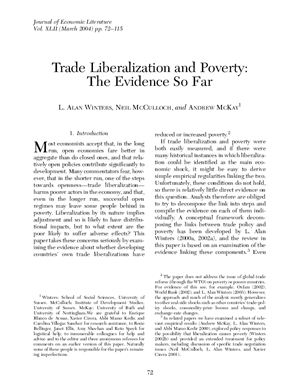Joual of Economic Literature Vol. XLII (March 2004) pp.
72–115
Most economists accept that, in the long run, open economies fare better in aggregate than do closed ones, and that relatively open policies contribute significantly to development. Many commentators fear, however, that in the shorter run, one of the steps towards openness—trade liberalization— harms poorer actors in the economy, and that, even in the longer run, successful open regimes may leave some people behind in poverty. Liberalization by its nature implies
adjustment and so is likely to have distributional impacts, but to what extent are the
poor likely to suffer adverse effects? This paper takes these conces seriously by examining
the evidence about whether developing countries’ own trade liberalizations have
reduced or increased poverty.
Most economists accept that, in the long run, open economies fare better in aggregate than do closed ones, and that relatively open policies contribute significantly to development. Many commentators fear, however, that in the shorter run, one of the steps towards openness—trade liberalization— harms poorer actors in the economy, and that, even in the longer run, successful open regimes may leave some people behind in poverty. Liberalization by its nature implies
adjustment and so is likely to have distributional impacts, but to what extent are the
poor likely to suffer adverse effects? This paper takes these conces seriously by examining
the evidence about whether developing countries’ own trade liberalizations have
reduced or increased poverty.

